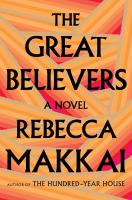 Searching. Searching. Searching for the right, the perfect adjectives to describe Rebecca Makkai‘s third and latest novel, The Great Believers. I’m leaning toward monumental, but that makes it sound as though the book is six inches thick and could easily be used as a doorstop. (The Great Believers actually comes in at 421 pages. So it’s no pocket edition, but it doesn’t even come close to doorstop territory.) I just don’t know; the story deals with big life-and-death questions, alongside of beautifully-rendered details that pull the reader into the story. All I can say is this: be prepared to find a rich experience within the pages of The Great Believers. It’s quite a journey, both through time and the themes of what it means to connect with people around you in times of crisis.
Searching. Searching. Searching for the right, the perfect adjectives to describe Rebecca Makkai‘s third and latest novel, The Great Believers. I’m leaning toward monumental, but that makes it sound as though the book is six inches thick and could easily be used as a doorstop. (The Great Believers actually comes in at 421 pages. So it’s no pocket edition, but it doesn’t even come close to doorstop territory.) I just don’t know; the story deals with big life-and-death questions, alongside of beautifully-rendered details that pull the reader into the story. All I can say is this: be prepared to find a rich experience within the pages of The Great Believers. It’s quite a journey, both through time and the themes of what it means to connect with people around you in times of crisis.
The Great Believers is one of those novels with two timelines. The first one is 1985, when the AIDS outbreak is wreaking havoc on the gay community in Chicago. I was certainly prepared for the grief; I was not as prepared for the anger and the activism and the overwhelming feeling of calamity that informed this part of the story. The plot centers on Yale Tishman, who is fairly recently arrived in Chicago and working as a director of development for an art gallery. He has just scored a great triumph by finding an unknown private collection of drawings by European artists who were active in the 1920s, and he is working on acquiring these for the gallery. Just as he embarks upon this new direction in his career, his personal life around him is falling apart because of the AIDS virus. There are hospital visits and funerals and test results, over and over and over again. His friend Nico’s funeral is one occasion which illustrates the grim reality of this time and place. Yale becomes more and more isolated as the disease becomes an epidemic, and increasingly comes to rely on Fiona, Nico’s younger sister.
Fiona steps into the center of the plot in the other timeline, which is Paris in 2015. Fiona has been estranged from her adult daughter, Claire, for years, but passionately desires to connect again. Unfortunately, Claire does not wish to be found, and as this part of the story unwinds, we see that the bitterness of the mother/daughter relationship has its roots in the past as described in the other timeline. Makkai connects these disparate story lines beautifully, and in deep and meaningful ways, contrasting large-scale loss with personal tragedy to great effect. It’s remarkable to me how she explores the interior lives of so many different characters in such thoughtful and sensitive ways, bringing out each character’s inner self in response to the events in the plot.
The novel as a whole deals with themes of human connection, of loss, of intention, and of far-reaching consequences. It is an intense, beautiful read. I’ve decided that this one stands alone; so no list of links to other books this time. I still don’t think I’ve found the perfect word to describe The Great Believers. I don’t even understand why it’s called The Great Believers, and believe me, I’ve spent quite some time wondering. And I don’t feel that this blog entry comes close to doing this book justice. You’ll just have to read it and see for yourself.
